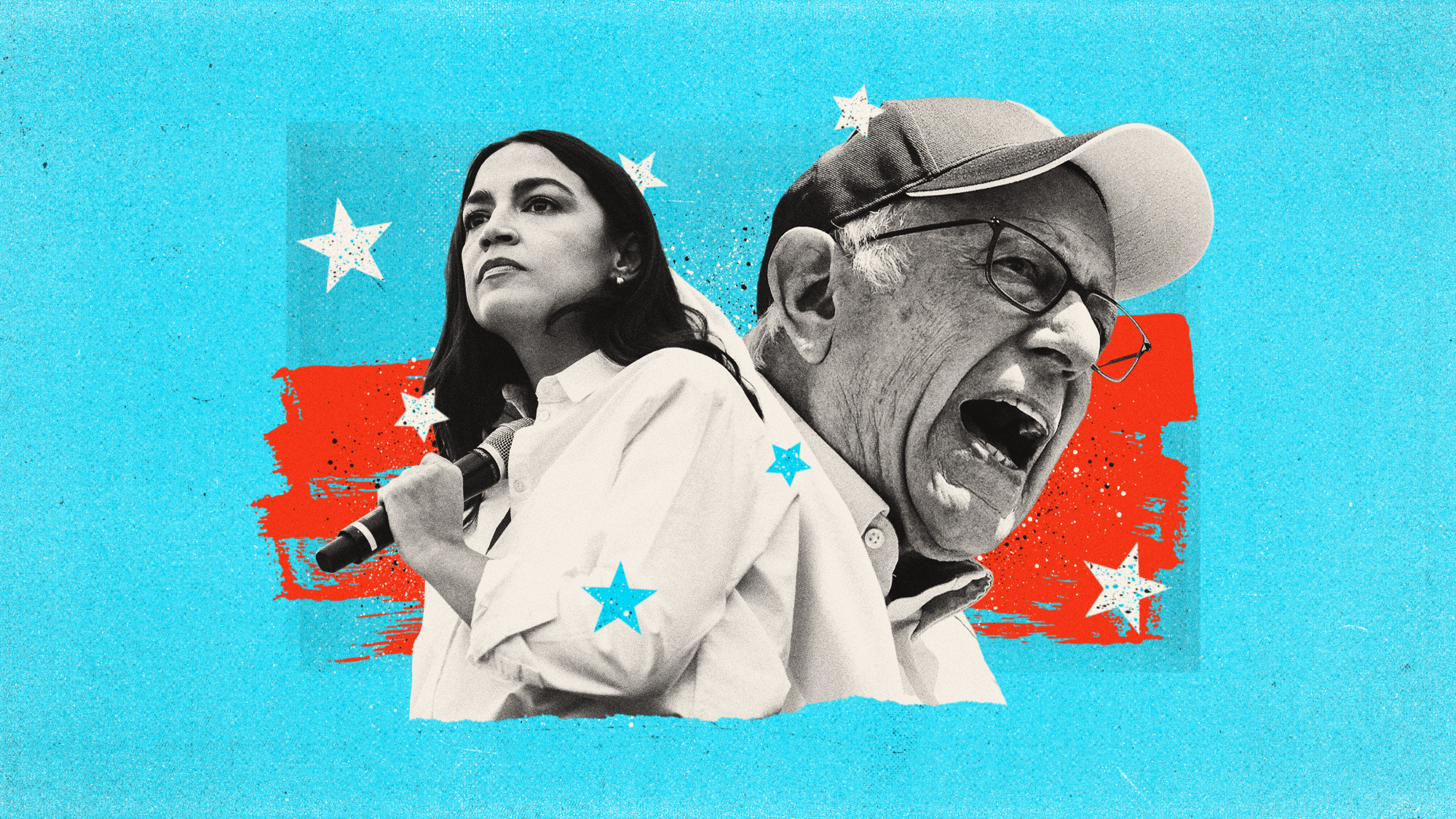Just how risky is it to nominate Bernie Sanders?
Let's do a cost benefit analysis


A free daily email with the biggest news stories of the day – and the best features from TheWeek.com
You are now subscribed
Your newsletter sign-up was successful
Democrats are freaking out that Sen. Bernie Sanders (I-Vt.), the tentative frontrunner for their party's presidential nomination, may not only lose to President Trump in November, but also reverse their midterm election gains in the suburbs. The latest bit of evidence is an internal poll circulated by rival Michael Bloomberg's campaign, suggesting just that.
These are not unreasonable fears — I myself have argued the suburbs are not the most fertile ground from which to launch a socialist revolution — but they can be overstated. Bloomberg's potential in the suburbs must be weighed against Sanders' relative strength in the upper Midwest. Mitt Romney-Hillary Clinton voters in the suburbs did not decide the 2016 election; Barack Obama-Donald Trump voters in the Rust Belt did. The Democrats' easiest paths to the White House are to win back these Obama-Trump voters or to turn out progressives who didn't vote for Clinton. Sanders may be their best option for doing both at the same time.
Whenever I say Sanders could be a stronger general election candidate than Bloomberg, people respond that as a conservative I merely want to see Republicans get to run against a socialist. But Trump himself sees the danger in facing an authentic grassroots movement. "Frankly, I'd rather run against Bloomberg than Bernie Sanders," he recently told reporters at the White House. "Because Sanders has real followers, whether you like him or not, whether you agree with him or not. I happen to think it's terrible what he says. But he has followers. Bloomberg's just buying his way in."
The Week
Escape your echo chamber. Get the facts behind the news, plus analysis from multiple perspectives.

Sign up for The Week's Free Newsletters
From our morning news briefing to a weekly Good News Newsletter, get the best of The Week delivered directly to your inbox.
From our morning news briefing to a weekly Good News Newsletter, get the best of The Week delivered directly to your inbox.
Sanders can try to outflank Trump on trade and foreign policy, arguing the president did not keep his campaign promises about bringing back manufacturing jobs or ending the endless wars. Maybe Sanders even pivots back to the center on immigration, where the former progressive skeptic of open borders has evolved as liberal Democrats have embraced expanded immigration, hitting employers who hire undocumented immigrants while running against the man who didn't build the wall (and whose White House is flirting with immigration increases of its own).
Against Bloomberg or even against former Vice President Joe Biden, Trump can still run as an outsider using the same playbook that succeeded against Clinton four years ago. Bloomberg is if anything more of a neoliberal technocrat and apologist for globalization. Biden played a big role in authorizing the Iraq War and passing the 1994 crime bill. But against Sanders, Trump would run a more conventional left-right campaign, warning about the dangers of socialism and talking about how great the economy is. It could work, especially as long as GDP growth keeps humming along, but it isn't how he has won in the past — arguably not even in the Republican primaries.
Bloomberg's polling shows the potency of the arguments against Sanders' positions, especially for people who like their current health insurance or doctor, are pleased with the status of their 401k, and want to sustain or improve on current levels of economic growth. But that is only one side of the argument that will determine the next president. Sanders is going to run on government benefits and solutions to health-care access, student loan debt, and income inequality while daring Trump to oppose them. It's entirely possible the scope of Sanders' platform plus the tangible job losses that would follow bans on private health insurance or hydraulic fracturing will allow Trump do so effectively. But Republicans have lost these kinds of arguments before, and Trump has never been especially comfortable making them.
Finally, you have to consider the context in which Bloomberg is likeliest to become the nominee. The billionaire former New York City mayor will have a hard time beating Sanders outright in the primaries because he has effectively waited until Super Tuesday to contest any states. He is more or less openly planning on defeating Sanders at a brokered convention, which could easily leave the Bernie brigades feeling as if the nomination was stolen from them. If Clinton suffered electorally because of mild Democratic National Committee favoritism that ultimately had a marginal impact on the 2016 primaries at best, Bloomberg — or whoever else emerges from this messy process — would be courting disaster.
A free daily email with the biggest news stories of the day – and the best features from TheWeek.com
Youthful Sanders supporters who feel disenfranchised are at least as likely to be a general election problem as well-heeled "Never Bernie" Democrats. Many Republicans shared the "Never Trump" conservatives' concerns about the future president — his character, his tweets, even the genuineness of his newfound conservatism — but relatively few were willing to vote against the GOP ticket over it. The anti-Bernie faction of the Democratic Party may find itself in a similar position.
None of this is to deny that nominating Sanders carries real risks. It will almost certainly become impossible to make the election a pure referendum on Trump rather than a binary choice. Florida may be wiped off the Democrats' electoral map. After making some headway toward normalizing democratic socialism as New Deal liberalism on steroids, it is bizarre that Sanders has indulged his critics' attempts to relitigate the Cold War. But a political climate in which Sanders is a leading candidate and Trump is the president suggests two things: All the Democratic contenders are flawed, and the range of possible outcomes is wider than the conventional wisdom predicts.
Want more essential commentary and analysis like this delivered straight to your inbox? Sign up for The Week's "Today's best articles" newsletter here.
W. James Antle III is the politics editor of the Washington Examiner, the former editor of The American Conservative, and author of Devouring Freedom: Can Big Government Ever Be Stopped?.
-
 Colbert, CBS spar over FCC and Talarico interview
Colbert, CBS spar over FCC and Talarico interviewSpeed Read The late night host said CBS pulled his interview with Democratic Texas state representative James Talarico over new FCC rules about political interviews
-
 The Week contest: AI bellyaching
The Week contest: AI bellyachingPuzzles and Quizzes
-
 Political cartoons for February 18
Political cartoons for February 18Cartoons Wednesday’s political cartoons include the DOW, human replacement, and more
-
 The billionaires’ wealth tax: a catastrophe for California?
The billionaires’ wealth tax: a catastrophe for California?Talking Point Peter Thiel and Larry Page preparing to change state residency
-
 Mamdani vows big changes as New York’s new mayor
Mamdani vows big changes as New York’s new mayorSpeed Read
-
 Bari Weiss’ ‘60 Minutes’ scandal is about more than one report
Bari Weiss’ ‘60 Minutes’ scandal is about more than one reportIN THE SPOTLIGHT By blocking an approved segment on a controversial prison holding US deportees in El Salvador, the editor-in-chief of CBS News has become the main story
-
 Has Zohran Mamdani shown the Democrats how to win again?
Has Zohran Mamdani shown the Democrats how to win again?Today’s Big Question New York City mayoral election touted as victory for left-wing populists but moderate centrist wins elsewhere present more complex path for Democratic Party
-
 Millions turn out for anti-Trump ‘No Kings’ rallies
Millions turn out for anti-Trump ‘No Kings’ ralliesSpeed Read An estimated 7 million people participated, 2 million more than at the first ‘No Kings’ protest in June
-
 Ghislaine Maxwell: angling for a Trump pardon
Ghislaine Maxwell: angling for a Trump pardonTalking Point Convicted sex trafficker's testimony could shed new light on president's links to Jeffrey Epstein
-
 The last words and final moments of 40 presidents
The last words and final moments of 40 presidentsThe Explainer Some are eloquent quotes worthy of the holders of the highest office in the nation, and others... aren't
-
 The anger fueling the Bernie Sanders and Alexandria Ocasio-Cortez barnstorming tour
The anger fueling the Bernie Sanders and Alexandria Ocasio-Cortez barnstorming tourTalking Points The duo is drawing big anti-Trump crowds in red states
